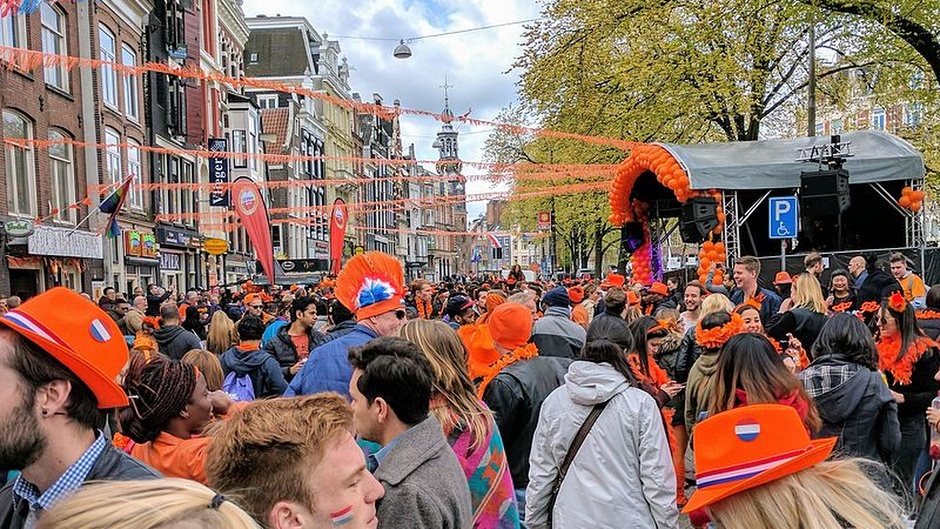King of kings
Last week it was the Dutch. This week it will be the Brits. Honouring their kings, that is.
02 MAY 2023 · 11:00 CET

Last week it was the Dutch. This week it will be the Brits.
Honouring their kings, that is.
Last Thursday was the annual Koningsdag in Holland, Willem-Alexander’s birthday. The day was less about the king himself, whose popularity has waned some twenty per cent over the corona period.
Koningsdag was more about celebrating a nation-wide party in every city and town, with streets, buildings and people wildly bedecked in orange.
Children everywhere could set up stalls to sell old toys, home-made jewellery, waffles or whatever. Oranjegekte – orange fever –breaks out in the Netherlands each Koningsdag, and during international sports events, especially football, ice skating and, these days, Formula One.
Why orange? The roots of the Dutch royal family, the House of Orange-Nassau, go back through the German William of Orange to the medieval Principality of Orange in southern France, north of Avignon.
If the Dutch royal family is supposed to epitomise Dutchness, the irony is that not a drop of real Dutch blood flows through their veins. Willem-Alexander is roughly nine-tenths German and one-tenth Russian (Peter the Great is a forefather).
His wife is fully Argentinian, or rather Italian-Spanish-Basque.
Which all goes to show how interrelated Europe’s nations really are.
‘Holy oil’
Next Saturday will be the coronation of Charles III in Britain, the first for most British people to experience. That will be a celebration in a whole different league from Koningsdag, as only the Brits can do.
The king will be fully centre stage. After all, its about him getting a crown placed on his head with the accompanying pomp and ceremony, religious and legal, befitting a long British tradition stretching back to the legendary King Arthur of the fifth or sixth centuries.
Actually the tradition reaches even further back. The Old Testament imagery of Zadok the priest, the high priest during the reigns of David and Solomon, is the centrepiece of Handel’s coronation anthem composed for the coronation of the German ruler from Hanover who became King George II of Great Britain in 1727.
Handel’s anthem will be played again at the coronation. No doubt many will associate it with the Champions League anthem – which it actually inspired.
There’s that German connection again. That too stretches way back. The British royal family changed their name from the House of Saxe-Coburg and Gotha to Windsor in 1917 due to anti-German sentiment during the Great War.
Princess Elizabeth (Windsor) adopted the name Mountbatten-Windsor after marrying Philip, prince of Greece and Denmark, whose mother was a Battenberg (later anglicised to Mountbatten), and whose father was a Schleswig-Holstein-Sonderburg-Glücksburg.

Complicated, isn’t it?
Adding an extra layer of ‘spiritual authority’ to the proceedings, Charles will be anointed with ‘holy oil’ that has already been consecrated at a ceremony in the Church of the Holy Sepulchre in Jerusalem.
This ‘sacred’ tradition was hidden from public view during Queen Elizabeth’s own anointing. Charles’ anointing ceremony – the Act of Consecration – will apparently also be conducted by Archbishop Welby in private before the crowning.
It all seems so official and Christian and steeped in authoritative tradition. So what should followers of the King of kings think of such proceedings? Well, ‘think’ is a good start. Resist being swept along with the media hype which has in the past promoted a sort of British exceptionalism.
‘Tamed’
Wild theories have emerged over the centuries that the people of Great Britain are ‘genetically, racially, and linguistically the direct descendants’ of the Ten Lost Tribes of ancient Israel. Thankfully those ideas have been widely discredited in Britain.
The Bible does not explicitly endorse any particular form of government except that which is just, peaceful, truthful and righteous. Monarchy is the one form it does specifically warn against, but at the same time it exhorts believers to honour and pray for kings.
We can thank God that most western modern monarchies have been ‘tamed’ by Christianity, particularly through British history beginning with the Magna Carta, a church-brokered effort to reign in the mad King John of the day.
Unfortunately equally spurious theories have not yet been discredited in Russia where the reigning autocrat holds to a sort of Russian exceptionalism, russky mir.
As billions around the world follow the colourful investiture of Charles next Saturday, I will be with participants from across Europe at the State of Europe Forum in Stockholm exploring what contribution God’s people can offer for freedom and peace across the continent.
You can join our livestream on Friday evening at 18:00 CET, and the Saturday penaries at 9:00 and 11:00 .
If you are up to it, you can follow the Coronation Prom presented by the All Souls Orchestra in the Royal Albert Hall to be live-linked on Saturday evening, seeking “to honour our new King’s reign and celebrate the ‘King of kings’.”
Jeff Fountain, Director of the Schuman Centre for European Studies. This article was first published on the author's blog, Weekly Word.
Published in: Evangelical Focus - Window on Europe - King of kings
